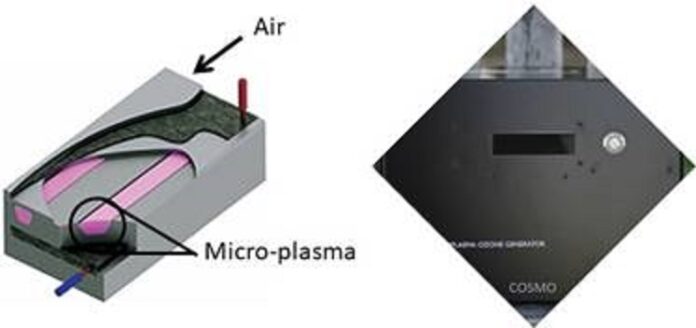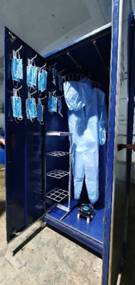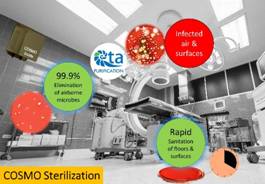
The days of suffering from dry, itching hands due to rinsing them multiple times with chemical disinfectants and soap as protection against contact infection of Covid-19 may soon be over. Several startups based in India’s different parts are now armed with a range of sustainable alternatives to conventional chemical-based decontaminants that can disinfect surfaces and even microcavities.
They also include technologies for disinfection of the biomedical waste generated at hospitals and the use of novel nanomaterials and chemical process innovations for long-lasting and safe sterilization of the recurrent use surfaces.
Safe disinfection and sanitization technologies have come from a total of 10 companies supported for disinfectants and sanitizers under Centre for Augmenting WAR with Covid-19 Health Crisis (CAWACH), an initiative by the National Science and Technology Entrepreneurship Development Board (NSTEDB), Department of Science and Technology (DST), implemented by Society for Innovation and Entrepreneurship (SINE), IIT Bombay.

Mumbai based startup Inphlox Water Systems, with expertise in treating complex polluted water and wastewater, modified their technology to design and develop a system for space and equipment disinfection to fight Covid-19 contamination titled VAJRA. The VAJRA KE Series uses a disinfection system consisting of a multistage disinfection process by incorporating electrostatic discharge that generates ozone and the powerful sterilizing effects of the UVC light spectrum. VAJRA Kavach-E (KE) uses advanced oxidation, electrostatic discharge, and UVC light spectrum to inactivate the viruses, bacteria, and other microbial strains present on the PPE. This saves costs by making the PPE, medical, and nonmedical gear reusable.
Inphlox Water Systems, which started with the Nidhi Prayas grant from DST (through IIT Bombay) for innovations in the water sector, used the CAWACH grant from DST to modify their technology it suitable for combating the Covid-19 infection. They prepared themselves for manufacturing 25 space disinfection systems per month, streamlined the production, supply chain, and logistics to scaling up the manufacturing capacity by 25% with each passing month thereon.

At present, they are coordinating with IIT Bombay’s and CCMB’s (Hyderabad) virology labs for further testing of these systems. The startup is ready with commercial product versions and is working on improving product certifications so that specialized labs can also use their solutions.
Coimbatore based Eta Purification offers advanced sterilization solutions. It is using environmentally-sound micro-cavity plasma technology. This novel technology, where the disinfectant is produced directly from air or oxygen, offers a sustainable alternative to conventional chemical-based decontamination.
The COSMO (Complete Sterilization by Microplasma Oxidation) system can rapidly disinfect Covid-19 infected areas, including quarantine facilities, ambulatory care, and equipment surfaces. This innovative micro-plasma sterilization system offers compact and scalable modular units robust, flexible, and energy-efficient.
The disinfectant is produced on-site, thereby eliminating the transport, storage, and handling of hazardous chemicals. These decontamination systems are ten times less than the conventional equivalent capacity system, making it suitable for resource constraint environments. Their advanced sterilization systems surpass hypochlorite and other traditional disinfectants in its ability to neutralize multi-drug resistant pathogens. The company has already provided customized solutions to hospitals and healthcare settings to sterilize selective critical care areas.
They have also taken this innovation to vulnerable communities. Their advanced integrated micro-plasma oxidation system for rapid sterilization has been fully developed and tested rigorously for commercial use.
A mechanical hand sanitizing dispenser machine quantifies hand sanitization steps through touchless, real-time monitoring via a dashboard is offered by Chennai-based startup MicroGO.
Weinnovate Biosolutions from Pune has developed silver nanoparticles based on non-alcoholic liquid sanitizer. Their technology pending for patent also inhibits the RNA replication activity – preventing the spread of the virus and blocks surface glycoproteins – making the virus ineffective.
An instant microwave-based handheld sterilizer ATULYA and a microwave-assisted cold sterilization device OPTIMASER for hazardous biomedical waste disinfection and making linen and PPE reusable is the offering from Lucknow based Maser Technology.
OPTIMASER is microwave-assisted cold sterilization superior technological advancement over the conventional Autoclave. It allows for disinfection and sterilization of the PPE Kits and the masks to ensure the 100 re-usabilities, also ensuring the cost-effectiveness of the same. ATULYA is an Instant Microwave-based handheld sterilizer that offers the cutting edge over the UV tube-based sterilizer, sanitizing sprays, and all possible sterilization and protection methods.
Incubators like SINE IIT Bombay FIIT, IIT Delhi, SIIC, IIT Kanpur, HTIC, IIT Madras, Venture Centre, Pune, IKP Knowledge Park, Hyderabad, KIIT-TBI, Bhubaneswar provided timely advice on technical progress, guided the startups to follow all necessary guidelines, signing of MoUs and so on.
DST Secretary Ashutosh Sharma said, “Through these and other compelling examples of Covid-19 relevant products and technologies, the deep foundations of the Indian science and technology have rapidly come to fore by a seamless marriage of the knowledge creation and its consumption. The structures and processes which made these extraordinary achievements possible are being incorporated in the upcoming Science, Technology and Innovation Policy 2020.”







